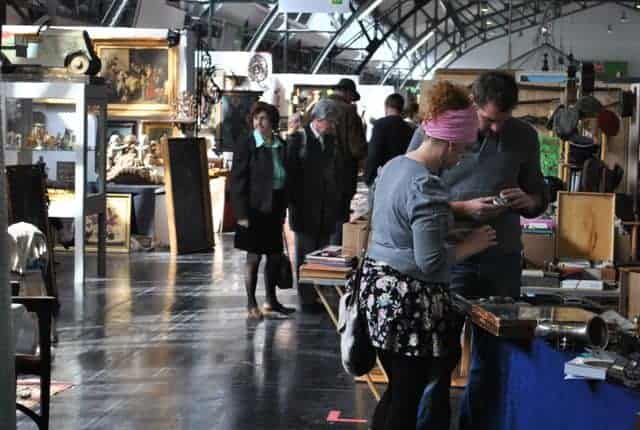As I’m actually at an antiques fair at the moment, I thought there was no better time than now to give you some tips to help you feel more comfortable the next time you visit an antiques fair or flea market. Antique fairs may seem intimidating to most of us who are not yet familiar with this strange world. For years, I myself mistakenly believed that flea markets were the only place to find good deals. Antique fairs are also some nice places, as are auction houses, if you know how they work!
So if you’ve ever wondered whether you should negotiate when buying antiques, La Roxy from the Daily Asker gives you 8 reasons why you can’t afford not to.
Here’s an addendum to the previous post, with practical tips for getting good prices at antique fairs and similar venues.
Opening scenario: An antique dealer buys a pendant from an estate sale for $40. This can translate into several possible resale outcomes: $120 for the guy with the Rolex who’s eager to seal the deal, $80 for the average passerby who never asks, $75 for the weak negotiator, $65 for the hardcore asker, and $55 for the friend or dealer.
Where would you like to fall on this spectrum?
Luck, the time of day, the type of venue and the attitude of the dealer all play a part. But there are things you can do to bring the price down. After talking to a few dealers and reflecting on my own experiences, here are my tips for getting a great deal at an antique market.
1. Always ask
Shocking, I know. But here’s why: You’re supposed to.
As I walked through the booths, I overheard all the negotiations taking place. Music to my ears! Dealers buying from dealers, experienced buyers driving down prices, friends selling to friends and newcomers paying full price. Bottom line: dealers expect people to negotiate. Sample snippets I heard:
Dealer, to friend: Tell me what you think is reasonable and I’ll tell you if it works for me.
Friend to dealer: I don’t know, what’s your bottom line, or what were you hoping to make?
Dealer: Well, give me a number you can live with and we’ll see if it matches mine.
Friend: What kind of number would you be happy with?
Dealer: Well, I paid $200. Normally I’d go $450, but for you I can do $250. Even $200 if you really want it.
Buyer: How much for this?
Seller: $40, but how about I just give you the lowest I can go. It’s the end of the day and I want to wrap it up. I can do $30.
Buyer: How about this?
Seller: Ideally $125… but I could do $80 because I like you.
“Sellers can tell the difference between being frugal and being a cheapskate. We hate cheapskates.”
These kinds of discussions happened at every end of the price spectrum, which is a reminder that negotiating isn’t just acceptable – it’s expected. Dealers price things with room to move. So paying the asking price is, in my view, a premium only paid by the uninitiated.
(A few traders didn’t offer any discounts, though, and they seemed as busy as their neighbours. I wonder what the best strategy is for maximising revenue: raise prices and make people feel like they’re getting a discount, price things at rock bottom and hope buyers understand the value they’re getting, or charge more than others, don’t negotiate, and sell fewer but more expensive things. This is probably an Econ 101 essay question. Too bad I don’t remember anything from when I took it in college, expect the supply and demand x graph. Any pricing experts out there want to shed some light on this?)
2. Don’t feel guilty about negotiating.
No one is on a charity mission. If a seller doesn’t make a profit she’s happy with, she won’t sell. Unless she’s terrible at her job, in which case she’s got bigger problems than giving you $40 off a $50 vase.
3. Be fair
This is just a general rule I have when it comes to asking: not just in markets, but everywhere. It’s rare that I have to remind myself, because people usually stick up for themselves and ask for more than they paid, but you never know.
4. The more you know, the more powerful you are.
This is kind of obvious — I mean, if you know how much a certain pattern of porcelain goes for on the market, you can decide whether or not to buy it based on the price. But consider the opposite: if you know little about an object, why trust a random merchant? I’d never buy a vase that claimed to be from the 19th century unless its age was not a factor in the price. Unless, of course, I could tell that it really was. (Valuing antiques is another matter entirely.) On a related note:
5. If you know a little about what you’re buying, try asking for the “dealer’s price.”
If you have a general idea of how much something is worth, it doesn’t hurt to offer what you think the seller paid for it. Worst-case scenario: she says no, or you meet halfway. (This is what a shop assistant told me. I can’t vouch for it personally).
6. Always keep Goodwill at the back of your mind as you shop.
This is good psychologically (because it makes you look and act like you have options and are therefore an empowered negotiator), but also practically. With regular trips to thrift shops, I’ve bought paintings, beautiful tea sets and Imari plates for the price of a tall latte – items identical to those that sell for dollars to the penny at such fairs. So if you’re after an antique or vintage fix, you might as well wait until something at the right price turns up at your local second-hand shop. Only splurge if it’s a special buyer’s remorse opportunity. (I’m talking about splurging – that crazy cool couch or whatever. If it’s within my everyday budget and would cost the same new, then it’s not such a tough call).
7. Appear frugal, not cheap
“Vendors can tell the difference between being frugal and being a cheapskate. We hate cheapskates”. This is what a trader at the fair told me, word for word, when I asked her about her negotiating methods. Buying and selling in this environment is a very personal transaction, which means that sellers respond better to certain types of buyers. So if you come across as a cheapskate, some may be put off. If you seem like you’re on a budget, they may respect your limits.
8. Same thing goes for enthusiasm
It’s common knowledge that you shouldn’t be too perky and excited, or the price will go up. But if you’re too cool, too bland, the seller may not want to “win you over”. Because you’re just a jerk. Sometimes sellers are sentimental about their goods. If they think it’s in good hands, they might be more willing to make a deal.



